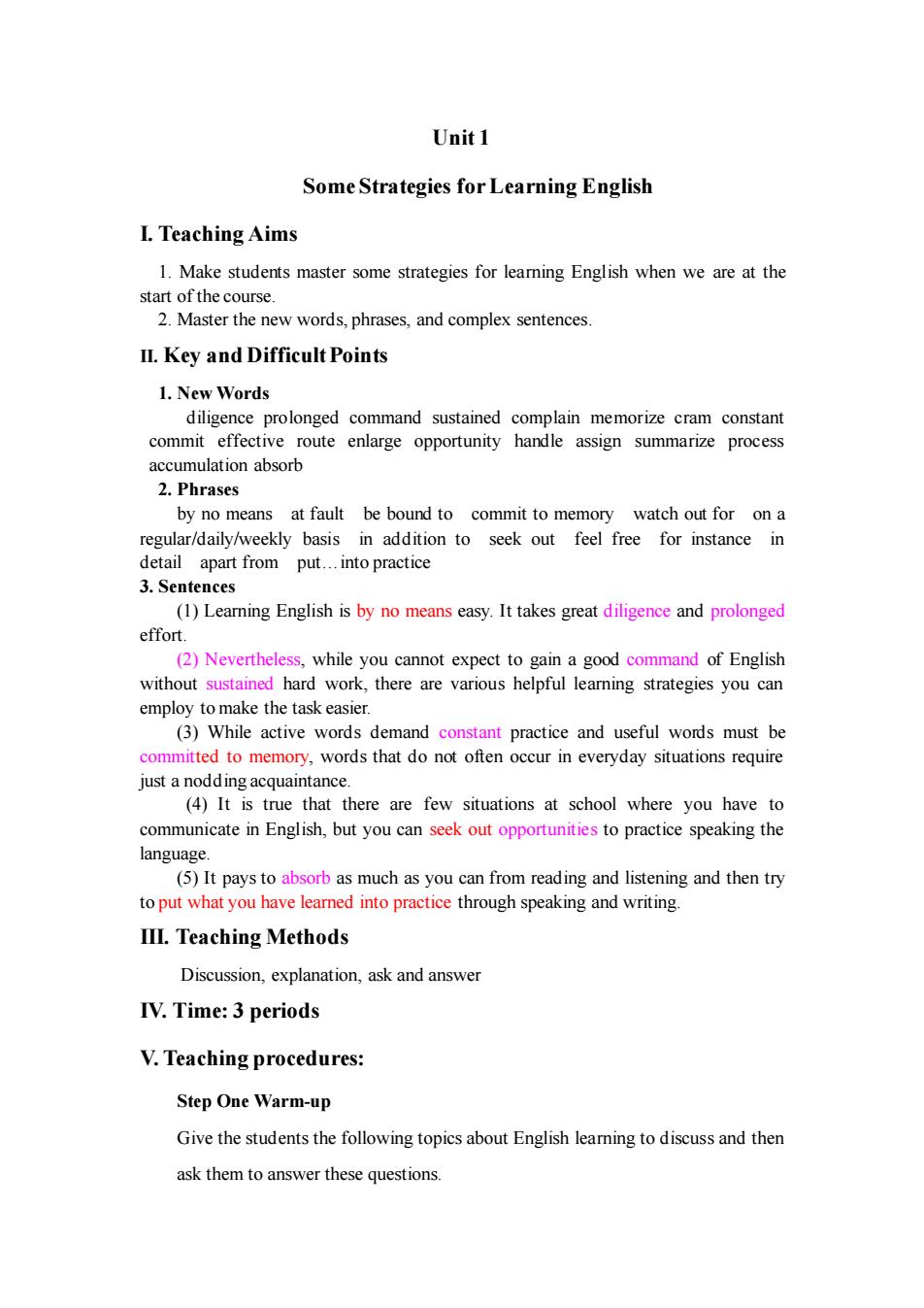
Unit 1 Some Strategies for Learning English I.Teaching Aims 1.Make students master some strategies for leaming English when we are at the aster the new words.phrases.and complex sentences. urse II.Key and Difficult Points 1.New Words commit effective route enlarge opportunity handle assign summarize process accumulation absorb 2.Phrases by no means at fault be bound to commit to memory watch out for on a s in addition to seek out feel free for instance in 3.Sentences (1)Learning English is by no means easy.It takes great diligence and prolonged effort (2)Nevertheless,while you cannot expect to gain a good command of English without hard work,there are various helpful leamning youcn employ to make the task easier. (3)While active words demand constant practice and useful words must be committed to memory,words that do not often occur in everyday situations require just a nodding acquaintance. (4)1t is true that there are few situations at school where you have to communicate in English,but you can seek out opportunities to practice speaking the anguage. (5)It pays to absorb as much as you can from reading and listening and then try to put what you have leamed into practice through speaking and writing. Ⅲ.Teaching Methods Discussion,explanation,ask and answer IV.Time:3 periods V.Teaching procedures: Step One Warm-up Give the students the following topics about English leaming to discuss and then ask them to answer these questions
Unit 1 Some Strategies for Learning English I. Teaching Aims 1. Make students master some strategies for learning English when we are at the start of the course. 2. Master the new words, phrases, and complex sentences. II. Key and Difficult Points 1. New Words diligence prolonged command sustained complain memorize cram constant commit effective route enlarge opportunity handle assign summarize process accumulation absorb 2. Phrases by no means at fault be bound to commit to memory watch out for on a regular/daily/weekly basis in addition to seek out feel free for instance in detail apart from put…into practice 3. Sentences (1) Learning English is by no means easy. It takes great diligence and prolonged effort. (2) Nevertheless, while you cannot expect to gain a good command of English without sustained hard work, there are various helpful learning strategies you can employ to make the task easier. (3) While active words demand constant practice and useful words must be committed to memory, words that do not often occur in everyday situations require just a nodding acquaintance. (4) It is true that there are few situations at school where you have to communicate in English, but you can seek out opportunities to practice speaking the language. (5) It pays to absorb as much as you can from reading and listening and then try to put what you have learned into practice through speaking and writing. III. Teaching Methods Discussion, explanation, ask and answer IV. Time: 3 periods V. Teaching procedures: Step One Warm-up Give the students the following topics about English learning to discuss and then ask them to answer these questions
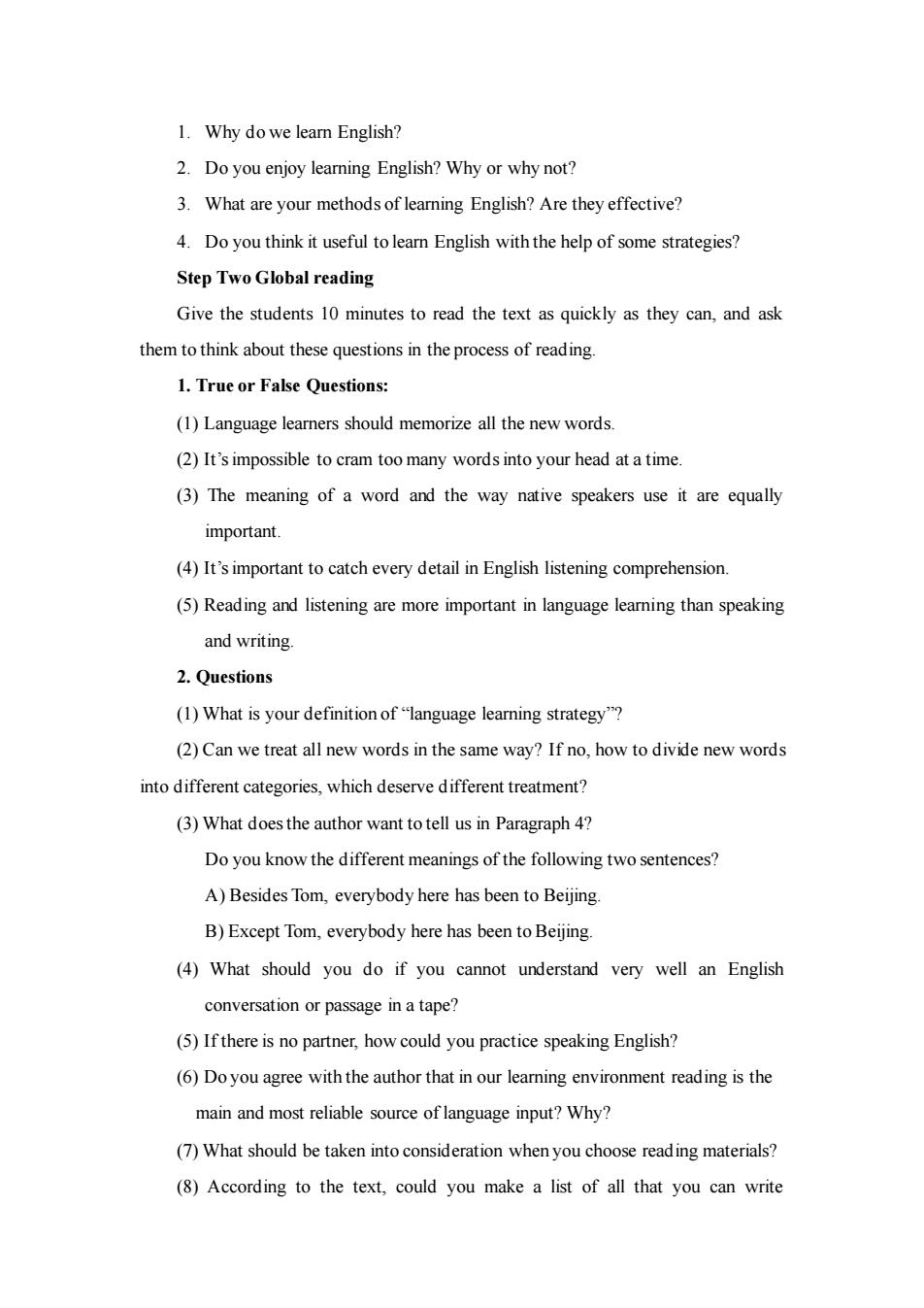
1.Why do we learn English? 2.Do you enjoy learning English?Why or why not? 3.What are your methods of learing English?Are they effective? 4.Do you think it useful to leam English with the help of some strategies? Step Two Global reading Give the students 10 minutes to read the text as quickly as they can,and ask them to think about these questions in the process of reading. 1.Trueor False Questions: (1)Language leamers should memorize all the new words. (2)It's impossible to cram too many words into your head at a time (3)The meaning of a word and the way native speakers use it are equally important. (4)It's important to catch every detail in English listening comprehension. (5)Reading and listening are more important in language leaming than speaking and writing. 2.Questions (1)What is your definition of"language learning strategy? (2)Can we treat all new words in the same way?If no,how to divide new words into different categories,which deserve different treatment? (3)What does the author want totell us in Paragraph 4? Do you know the different meanings of the following two sentences? A)Besides Tom,everybody here has been to Beijing. B)Except Tom,everybody here has been to Beijing. (4)What should you do if you cannot understand very well an English conversation or passage in a tape? (5)Ifthere is no partner,how could you practice speaking English? (6)Do you agree with the author that in our learning environment reading is the main and most reliable source of language input?Why? (7)What should be taken into consideration whenyou choose reading materials? (8)According to the text,could you make a list of all that you can write
1. Why do we learn English? 2. Do you enjoy learning English? Why or why not? 3. What are your methods of learning English? Are they effective? 4. Do you think it useful to learn English with the help of some strategies? Step Two Global reading Give the students 10 minutes to read the text as quickly as they can, and ask them to think about these questions in the process of reading. 1. True or False Questions: (1) Language learners should memorize all the new words. (2) It’simpossible to cram too many words into your head at a time. (3) The meaning of a word and the way native speakers use it are equally important. (4) It’s important to catch every detail in English listening comprehension. (5) Reading and listening are more important in language learning than speaking and writing. 2. Questions (1) What is your definition of “language learning strategy”? (2) Can we treat all new words in the same way? If no, how to divide new words into different categories, which deserve different treatment? (3) What does the author want to tell us in Paragraph 4? Do you know the different meanings of the following two sentences? A) Besides Tom, everybody here has been to Beijing. B) Except Tom, everybody here has been to Beijing. (4) What should you do if you cannot understand very well an English conversation or passage in a tape? (5) If there is no partner, how could you practice speaking English? (6) Do you agree with the author that in our learning environment reading is the main and most reliable source of language input? Why? (7) What should be taken into consideration when you choose reading materials? (8) According to the text, could you make a list of all that you can write
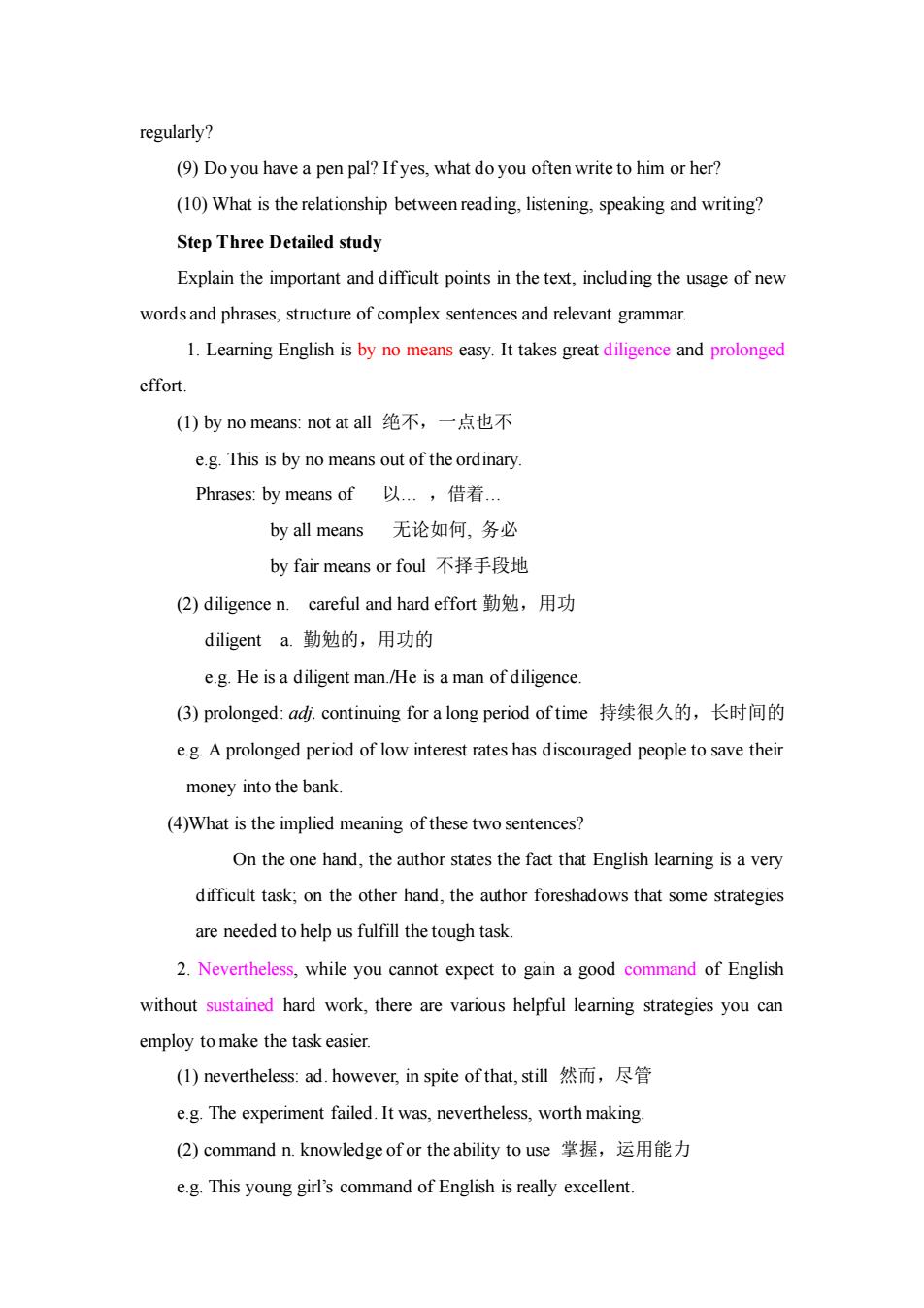
regularly? (9)Do you have a pen pal?Ifyes,what do you often write to him or her? (10)What is the relationship between reading.listening,speaking and writing? Step Three Detailed study Explain the important and difficult points in the text,including the usage of new words and phrases,structure of complex sentences and relevant grammar. 1.Leaming English is by no means easy.It takes great diligence and prolonged effort. (I)by no means:not at all绝不,一点也不 e.g.This is by no means out of the ordinary Phrases::by means of以..,借着. by all means无论如何,务必 by fair means or foul不择手段地 (2)diligence n.careful and hard effort勤勉,用功 diligent a.勤勉的,用功的 e.g.He is a diligent man./He is a man of diligence. (3)prolonged:ad.continuing for a long period oftime持续很久的,长时间的 e.g.A prolonged period of low interest rates has discouraged people to save their money into the bank. (4)What is the implied meaning of these two sentences? On the one hand,the author states the fact that English leaming is a very difficult task;on the other hand,the author foreshadows that some strategies are needed to help us fulfill the tough task. 2.Nevertheless,while you cannot expect to gain a good command of English without sustained hard work,there are various helpful leaming strategies you can employ to make the task easier. (I)nevertheless:ad.however,in spite of that,.stil然而,尽管 e.g.The experiment failed.It was,nevertheless,worth making. (2)command n.knowledge of or the ability to use掌握,运用能力 e.g.This young girl's command of English is really excellent
regularly? (9) Do you have a pen pal? If yes, what do you often write to him or her? (10) What is the relationship between reading, listening, speaking and writing? Step Three Detailed study Explain the important and difficult points in the text, including the usage of new words and phrases, structure of complex sentences and relevant grammar. 1. Learning English is by no means easy. It takes great diligence and prolonged effort. (1) by no means: not at all 绝不,一点也不 e.g. This is by no means out of the ordinary. Phrases: by means of 以… ,借着… by all means 无论如何, 务必 by fair means or foul 不择手段地 (2) diligence n. careful and hard effort 勤勉,用功 diligent a. 勤勉的,用功的 e.g. He is a diligent man./He is a man of diligence. (3) prolonged: adj. continuing for a long period of time 持续很久的,长时间的 e.g. A prolonged period of low interest rates has discouraged people to save their money into the bank. (4)What is the implied meaning of these two sentences? On the one hand, the author states the fact that English learning is a very difficult task; on the other hand, the author foreshadows that some strategies are needed to help us fulfill the tough task. 2. Nevertheless, while you cannot expect to gain a good command of English without sustained hard work, there are various helpful learning strategies you can employ to make the task easier. (1) nevertheless: ad. however, in spite of that, still 然而,尽管 e.g. The experiment failed. It was, nevertheless, worth making. (2) command n. knowledge of or the ability to use 掌握,运用能力 e.g. This young girl’s command of English is really excellent
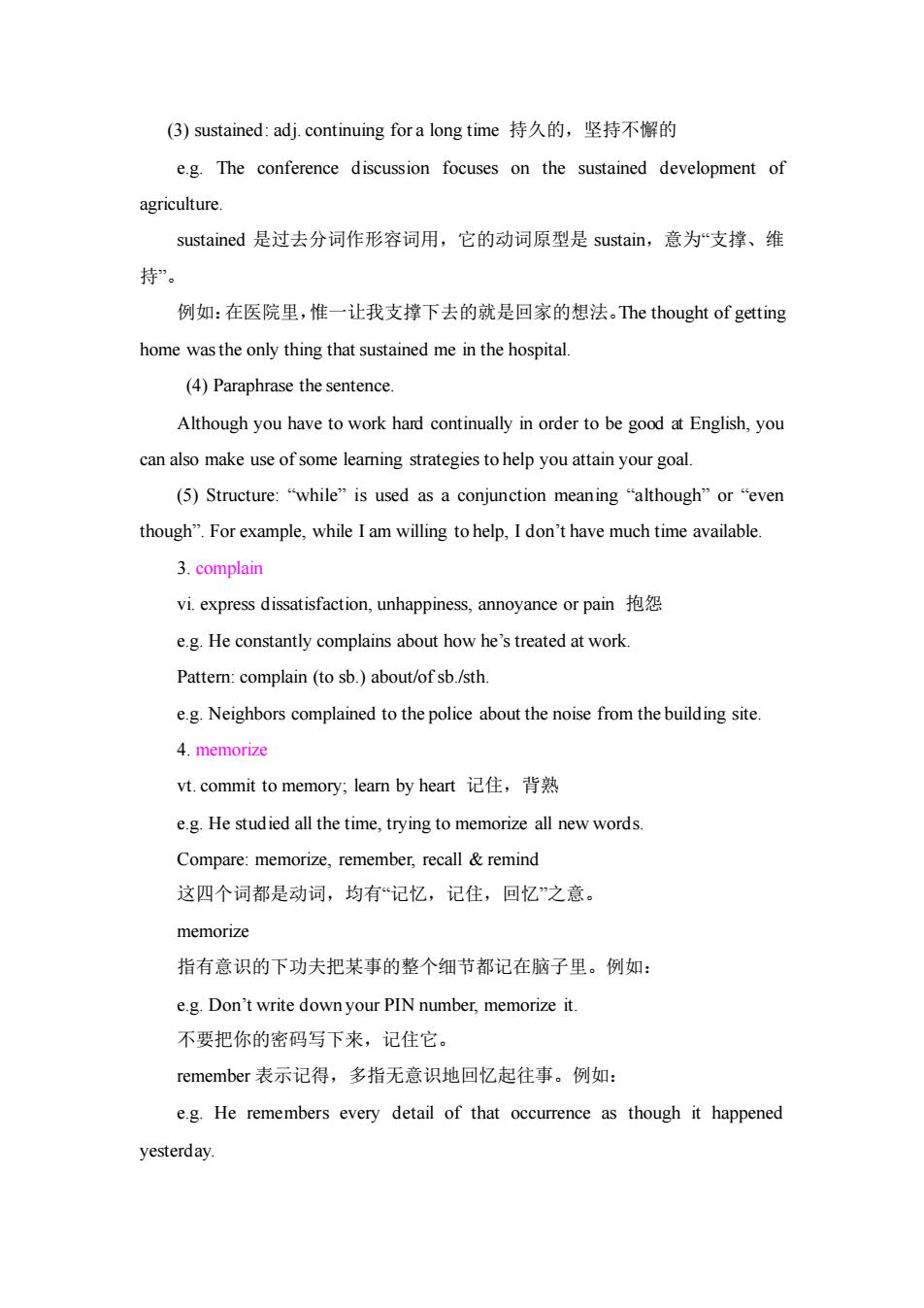
(3)sustained:adj.continuing for a long time持久的,坚持不懈的 e.g.The conference discussion focuses on the sustained development of agriculture sustained是过去分词作形容词用,它的动词原型是sustain,意为“支撑、维 持”。 例如:在医院里,惟一让我支撑下去的就是回家的想法。The thought of getting home was the only thing that sustained me in the hospital (4)Paraphrase the sentence. Although you have to work hard continually in order to be good at English,you can also make use of some leaming strategies tohelp you attain your goal. ()Structure:while”is used as a conjunction meaning“"although”or“even though".For example,while Iam willing to help,I don't have much time available. 3.complain vi.express dissatisfaction,unhappiness,annoyance or pain e.g.He constantly complains about how he's treated at work. Pattem:complain(to sb.)about/ofsb./sth. e.g.Neighbors complained to the police about the noise from the building site 4.memorize vt.commit to memory;leamn by heart记住,背熟 e.g.He studied all the time,trying to memorize all new words Compare:memorize,remember,recall&remind 这四个词都是动词,均有“记忆,记住,回忆”之意。 memorize 指有意识的下功夫把某事的整个细节都记在脑子里。例如: e.g.Don't write down your PIN number,memorize it 不要把你的密码写下来,记住它。 remember表示记得,多指无意识地回忆起往事。例如: e.g.He remembers every detail of that occurrence as though it happened yesterday
(3) sustained: adj. continuing for a long time 持久的,坚持不懈的 e.g. The conference discussion focuses on the sustained development of agriculture. sustained 是过去分词作形容词用,它的动词原型是 sustain,意为“支撑、维 持”。 例如:在医院里,惟一让我支撑下去的就是回家的想法。The thought of getting home was the only thing that sustained me in the hospital. (4) Paraphrase the sentence. Although you have to work hard continually in order to be good at English, you can also make use of some learning strategies to help you attain your goal. (5) Structure: “while” is used as a conjunction meaning “although” or “even though”. For example, while I am willing to help, I don’t have much time available. 3. complain vi. express dissatisfaction, unhappiness, annoyance or pain 抱怨 e.g. He constantly complains about how he’s treated at work. Pattern: complain (to sb.) about/of sb./sth. e.g. Neighbors complained to the police about the noise from the building site. 4. memorize vt. commit to memory; learn by heart 记住,背熟 e.g. He studied all the time, trying to memorize all new words. Compare: memorize, remember, recall & remind 这四个词都是动词,均有“记忆,记住,回忆”之意。 memorize 指有意识的下功夫把某事的整个细节都记在脑子里。例如: e.g. Don’t write down your PIN number, memorize it. 不要把你的密码写下来,记住它。 remember 表示记得,多指无意识地回忆起往事。例如: e.g. He remembers every detail of that occurrence as though it happened yesterday
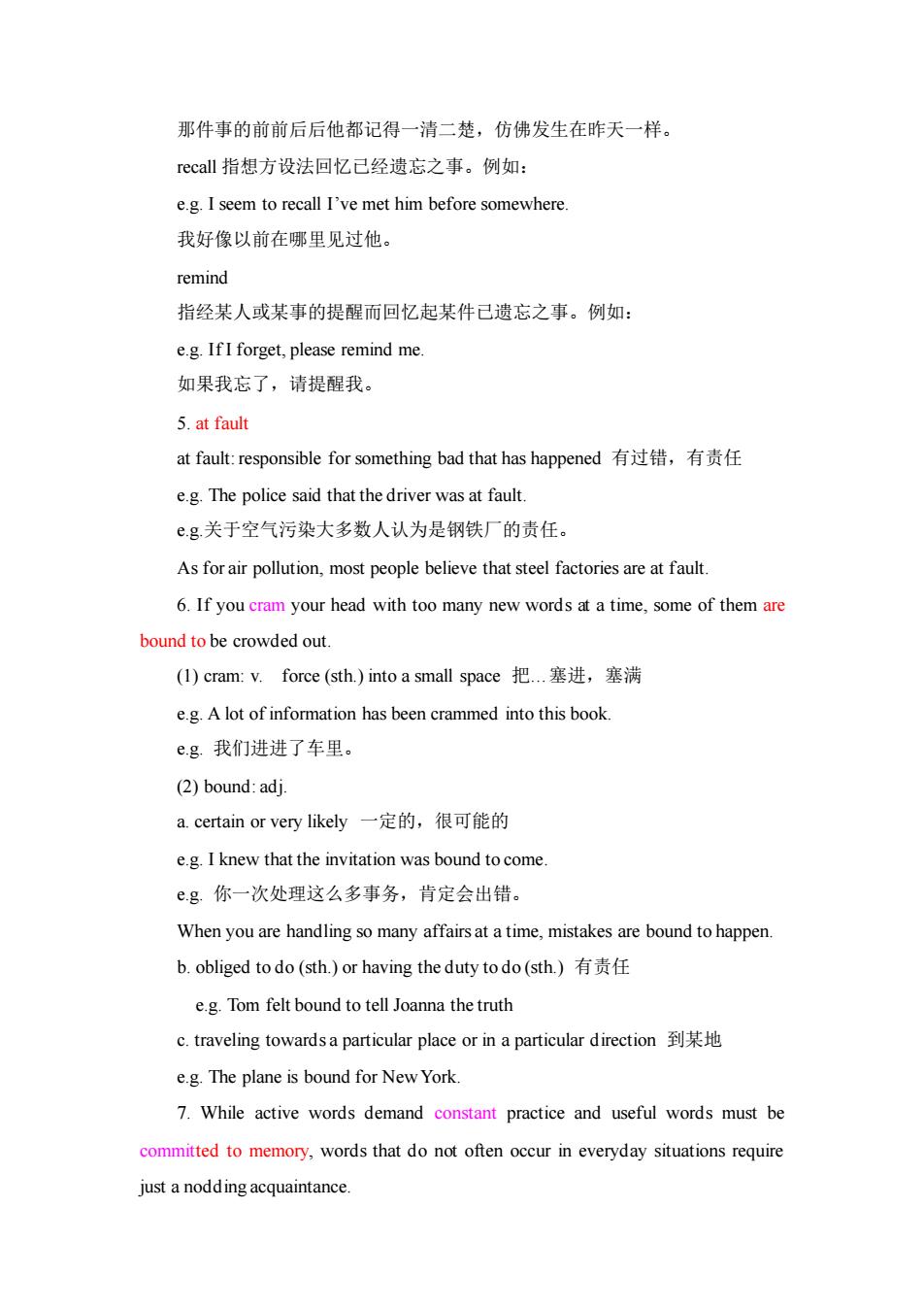
那件事的前前后后他都记得一清二楚,仿佛发生在昨天一样。 recall指想方设法回忆已经遗忘之事。例如: e.g.I seem to recall I've met him before somewhere 我好像以前在哪里见过他: remind 指经某人或某事的提醒而回忆起某件已遗忘之事。例如: e.g.IfI forget,please remind me. 如果我忘了,请提醒我。 5.at fault at fault:responsible for something bad that has happened有过错,有责任 e.g.The police said that the driver was at fault eg关于空气污染大多数人认为是钢铁厂的责任。 As for air pollution,most people believe that steel factories are at fault. 6.If you cram your head with too many new words at a time.some of them are bound to be crowded out. ()cram:V.force(sth)into a small space把.塞进,塞满 e.g.A lot of information has been crammed into this book. eg我们进进了车里。 (2)bound:adj. a.certain or very likely一定的,很可能的 e.g.I knew that the invitation was bound to come eg你一次处理这么多事务,肯定会出错。 When you are handling so many affairs at a time,mistakes are bound to happen. b.obliged to do(sth)or having the duty to do(sth)有责任 e.g.Tom felt bound to tell Joanna the truth c.traveling towardsa particular place or in a particular direction e.g.The plane is bound for New York. 7.While active words demand constant practice and useful words must be committed to memory,words that do not often occur in everyday situations require just a nodding acquaintance
那件事的前前后后他都记得一清二楚,仿佛发生在昨天一样。 recall 指想方设法回忆已经遗忘之事。例如: e.g. I seem to recall I’ve met him before somewhere. 我好像以前在哪里见过他。 remind 指经某人或某事的提醒而回忆起某件已遗忘之事。例如: e.g. If I forget, please remind me. 如果我忘了,请提醒我。 5. at fault at fault: responsible for something bad that has happened 有过错,有责任 e.g. The police said that the driver was at fault. e.g.关于空气污染大多数人认为是钢铁厂的责任。 As for air pollution, most people believe that steel factories are at fault. 6. If you cram your head with too many new words at a time, some of them are bound to be crowded out. (1) cram: v. force (sth.) into a small space 把…塞进,塞满 e.g. A lot of information has been crammed into this book. e.g. 我们进进了车里。 (2) bound: adj. a. certain or very likely 一定的,很可能的 e.g. I knew that the invitation was bound to come. e.g. 你一次处理这么多事务,肯定会出错。 When you are handling so many affairs at a time, mistakes are bound to happen. b. obliged to do (sth.) or having the duty to do (sth.) 有责任 e.g. Tom felt bound to tell Joanna the truth c. traveling towards a particular place or in a particular direction 到某地 e.g. The plane is bound for New York. 7. While active words demand constant practice and useful words must be committed to memory, words that do not often occur in everyday situations require just a nodding acquaintance

(1)constant:adj. a.happening regularly or all the time经常发生的,不断的 e.g.There was a constant stream of visitors to the house e.g.她的诊室不断有家长前来求助 Her clinic has a constant stream of parents wanting help. b.staying the same不变的,固定的 e.g.The truck was traveling at a fairly constant speed c.loyal and faithful忠实的 e.g.He isa constant friend. (2)commit:v. ado(sth)wrong or illegal做错事,犯罪,犯错等 e.g.Women commit fewer crimes than men. b.say that(sb.)will definitely do(sth)or must do(sth.)承诺,保证(做某事, 遵守协议等) e.g.He has clearly committed his government to continuing economic reform. c.pledge devotion to(sb.or sth.)忠于(某个人,机构等) e.g.He wasn't yet ready to commit to the relationship. Phrases: commit a crime/error/murder/arson/suicide犯罪/犯错/犯谋杀罪/犯纵火罪/自 commit (sb.)to doing(sth.) 向某人承诺做某事 commit oneself to(sth.) 致力于 commit(sth.)to memory 把记住 commit (sth.)to paper 把写下来 commit(sth.)to flames 烧毁某物,将某物付之一炬 (3)Paraphrase the sentence. We should often practice the use of active words,those which frequently occur in everyday use,and leam by heart those useful words,while we only need recognize those words which occur less frequently in everyday situations. (4)Analyze the structure of the sentence
(1) constant: adj. a. happening regularly or all the time 经常发生的,不断的 e.g. There was a constant stream of visitors to the house. e.g. 她的诊室不断有家长前来求助。 Her clinic has a constant stream of parents wanting help. b. staying the same 不变的,固定的 e.g. The truck was traveling at a fairly constant speed. c. loyal and faithful 忠实的 e.g. He is a constant friend. (2) commit: v. a. do (sth.) wrong or illegal 做错事,犯罪,犯错等 e.g. Women commit fewer crimes than men. b. say that (sb.) will definitely do (sth.) or must do (sth.) 承诺,保证(做某事, 遵守协议等) e.g. He has clearly committed his government to continuing economic reform. c. pledge devotion to (sb. or sth.) 忠于(某个人,机构等) e.g. He wasn’t yet ready to commit to the relationship. Phrases: commit a crime/error/murder/arson/suicide 犯罪/犯错/犯谋杀罪/犯纵火罪/自 杀 commit (sb.) to doing (sth.) 向某人承诺做某事 commit oneself to (sth.) 致力于 commit (sth.) to memory 把…记住 commit (sth.) to paper 把…写下来 commit (sth.) to flames 烧毁某物, 将某物付之一炬 (3) Paraphrase the sentence. We should often practice the use of active words, those which frequently occur in everyday use, and learn by heart those useful words, while we only need recognize those words which occur less frequently in everyday situations. (4)Analyze the structure of the sentence
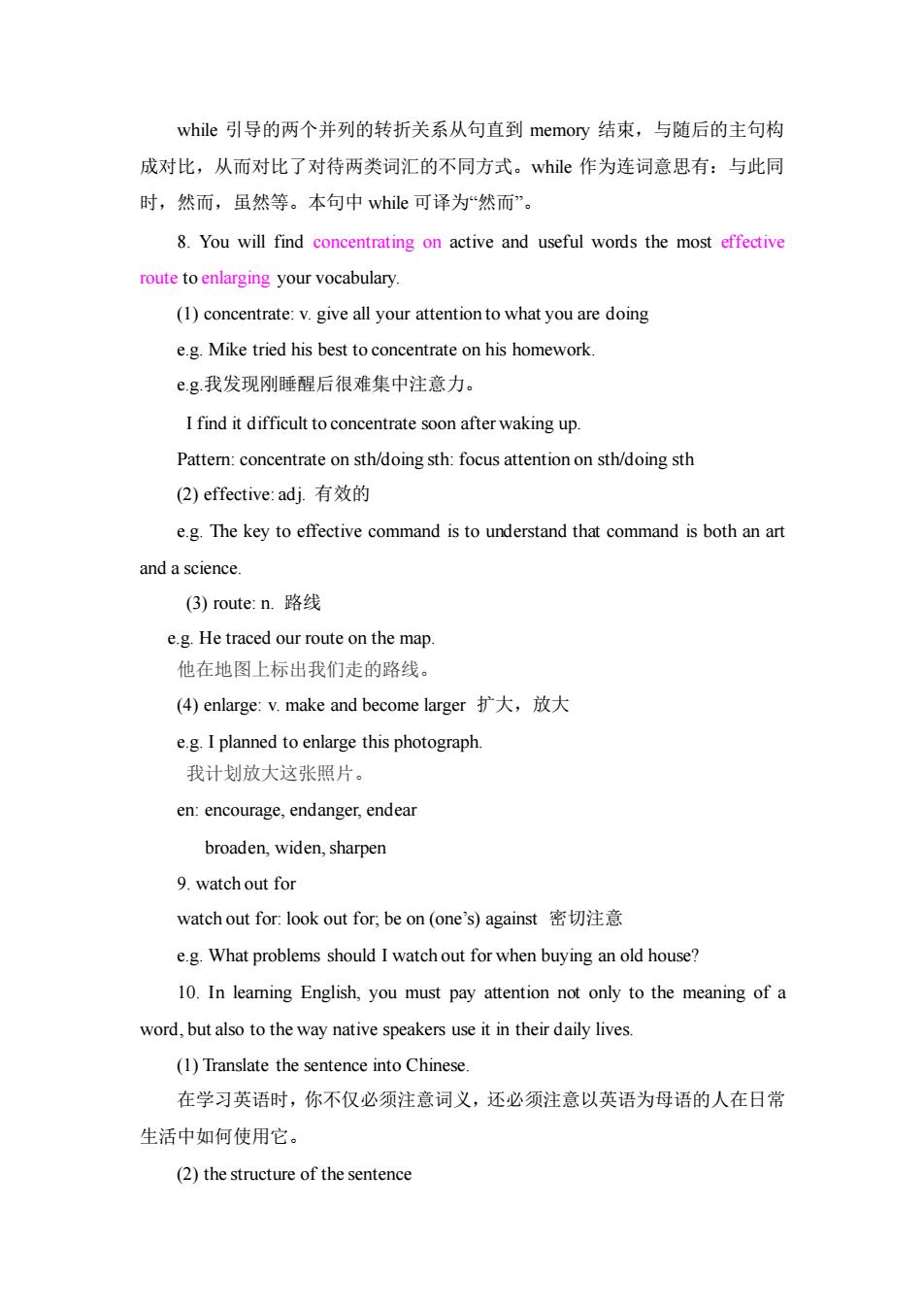
while引导的两个并列的转折关系从句直到memory结束,与随后的主句构 成对比,从而对比了对待两类词汇的不同方式。whl©作为连词意思有:与此同 时,然而,虽然等。本句中while可译为然而”。 8.You will find concentrating on active and useful words the most effective route to enlarging your vocabulary. (1)concentrate:v.give all your attention to what you are doing e.g.Mike tried his best to concentrate on his homework. ©g我发现刚睡醒后很难集中注意力。 I find it difficult to concentrate soon after waking up. Pattem:concentrate on sth/doing sth:focus attention on sth/doing sth (2)effective:adj有效的 e.g.The key to effective command is to understand that command is both an art and a science (3)route:n.路线 e.g.He traced our route on the map 他在地图上标出我们走的路线。 (4)enlarge:v.make and become larger扩大,放大 e.g.I planned to enlarge this photograph. 我计划放大这张照片。 en:encourage,endanger,endear broaden,widen,sharpen 9.watch out for watch out for:.look out for,be on(one's)against密t切注意 e.g.What problems should I watch out for when buying an old house? 10.In leaming English,you must pay attention not only to the meaning of a word,but also to the way native speakers use it in their daily lives. (1)Translate the sentence into Chinese. 在学习英语时,你不仅必须注意词义,还必须注意以英语为母语的人在日常 生活中如何使用它。 (2)the structure of the sentence
while 引导的两个并列的转折关系从句直到 memory 结束,与随后的主句构 成对比,从而对比了对待两类词汇的不同方式。while 作为连词意思有:与此同 时,然而,虽然等。本句中 while 可译为“然而”。 8. You will find concentrating on active and useful words the most effective route to enlarging your vocabulary. (1) concentrate: v. give all your attention to what you are doing e.g. Mike tried his best to concentrate on his homework. e.g.我发现刚睡醒后很难集中注意力。 I find it difficult to concentrate soon after waking up. Pattern: concentrate on sth/doing sth: focus attention on sth/doing sth (2) effective: adj. 有效的 e.g. The key to effective command is to understand that command is both an art and a science. (3) route: n. 路线 e.g. He traced our route on the map. 他在地图上标出我们走的路线。 (4) enlarge: v. make and become larger 扩大,放大 e.g. I planned to enlarge this photograph. 我计划放大这张照片。 en: encourage, endanger, endear broaden, widen, sharpen 9. watch out for watch out for: look out for; be on (one’s) against 密切注意 e.g. What problems should I watch out for when buying an old house? 10. In learning English, you must pay attention not only to the meaning of a word, but also to the way native speakers use it in their daily lives. (1) Translate the sentence into Chinese. 在学习英语时,你不仅必须注意词义,还必须注意以英语为母语的人在日常 生活中如何使用它。 (2) the structure of the sentence
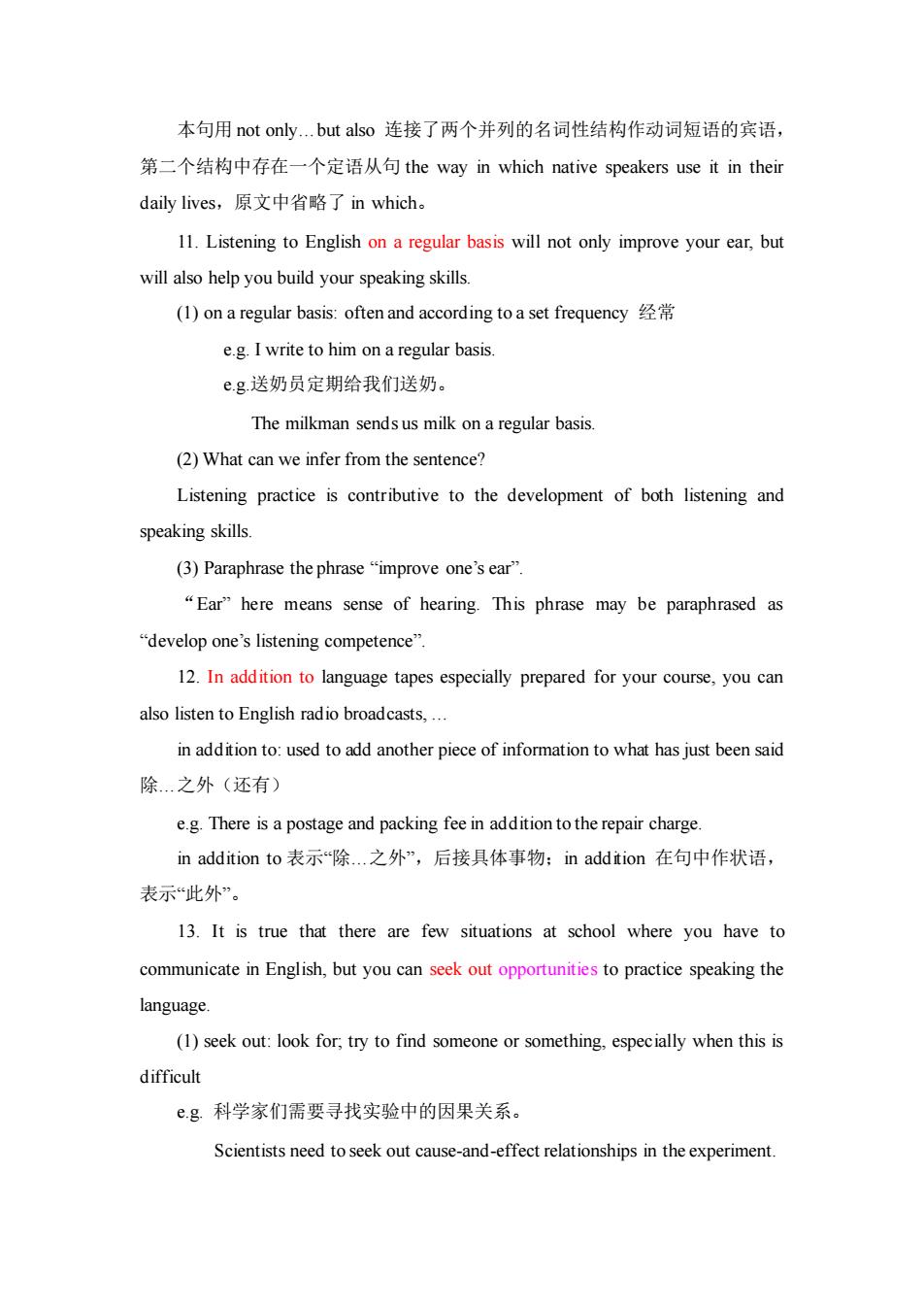
本句用not only.but also连接了两个并列的名词性结构作动词短语的宾语, 第二个结构中存在一个定语从句the way in which native speakers use it in their daily lives,原文中省略了in which。 11.Listening to English on a regular basis will not only improve your ear,but will also help you build your speaking skills. (1)on a regular basis:often and according to a set frequency e.g.I write to him on a regular basis eg送奶员定期给我们送奶, The milkman sends us milk on a regular basis. (2)What can we infer from the sentence? Listening practice is contributive to the development of both listening and speaking skills. (3)Paraphrase the phrase"improve one's ear" "Ear"here means sense of hearing.This phrase may be paraphrased as "develop one's listening competence". 12.In addition to language tapes especially prepared for your course,you can also listen to English radio broadeasts, in addition to:used to add another piece of information to what has just been said 除之外(还有) e.g.There is a postage and packing fee in addition tothe repair charge in addition to表示除之外”,后接具体事物:in addition在句中作状语, 表示“此外”。 13.It is true that there are few situations at school where you have to communicate in English,but you can seek out to practice speaking the language. (1)seek out:look for,try to find someone or something,especially when this is difficult eg科学家们需要寻找实验中的因果关系。 Scientists need to seek out cause-and-effect relationships in the experiment
本句用 not only…but also 连接了两个并列的名词性结构作动词短语的宾语, 第二个结构中存在一个定语从句 the way in which native speakers use it in their daily lives,原文中省略了 in which。 11. Listening to English on a regular basis will not only improve your ear, but will also help you build your speaking skills. (1) on a regular basis: often and according to a set frequency 经常 e.g. I write to him on a regular basis. e.g.送奶员定期给我们送奶。 The milkman sends us milk on a regular basis. (2) What can we infer from the sentence? Listening practice is contributive to the development of both listening and speaking skills. (3) Paraphrase the phrase “improve one’s ear”. “Ear” here means sense of hearing. This phrase may be paraphrased as “develop one’s listening competence”. 12. In addition to language tapes especially prepared for your course, you can also listen to English radio broadcasts, … in addition to: used to add another piece of information to what has just been said 除…之外(还有) e.g. There is a postage and packing fee in addition to the repair charge. in addition to 表示“除…之外”,后接具体事物;in addition 在句中作状语, 表示“此外”。 13. It is true that there are few situations at school where you have to communicate in English, but you can seek out opportunities to practice speaking the language. (1) seek out: look for; try to find someone or something, especially when this is difficult e.g. 科学家们需要寻找实验中的因果关系。 Scientists need to seek out cause-and-effect relationships in the experiment
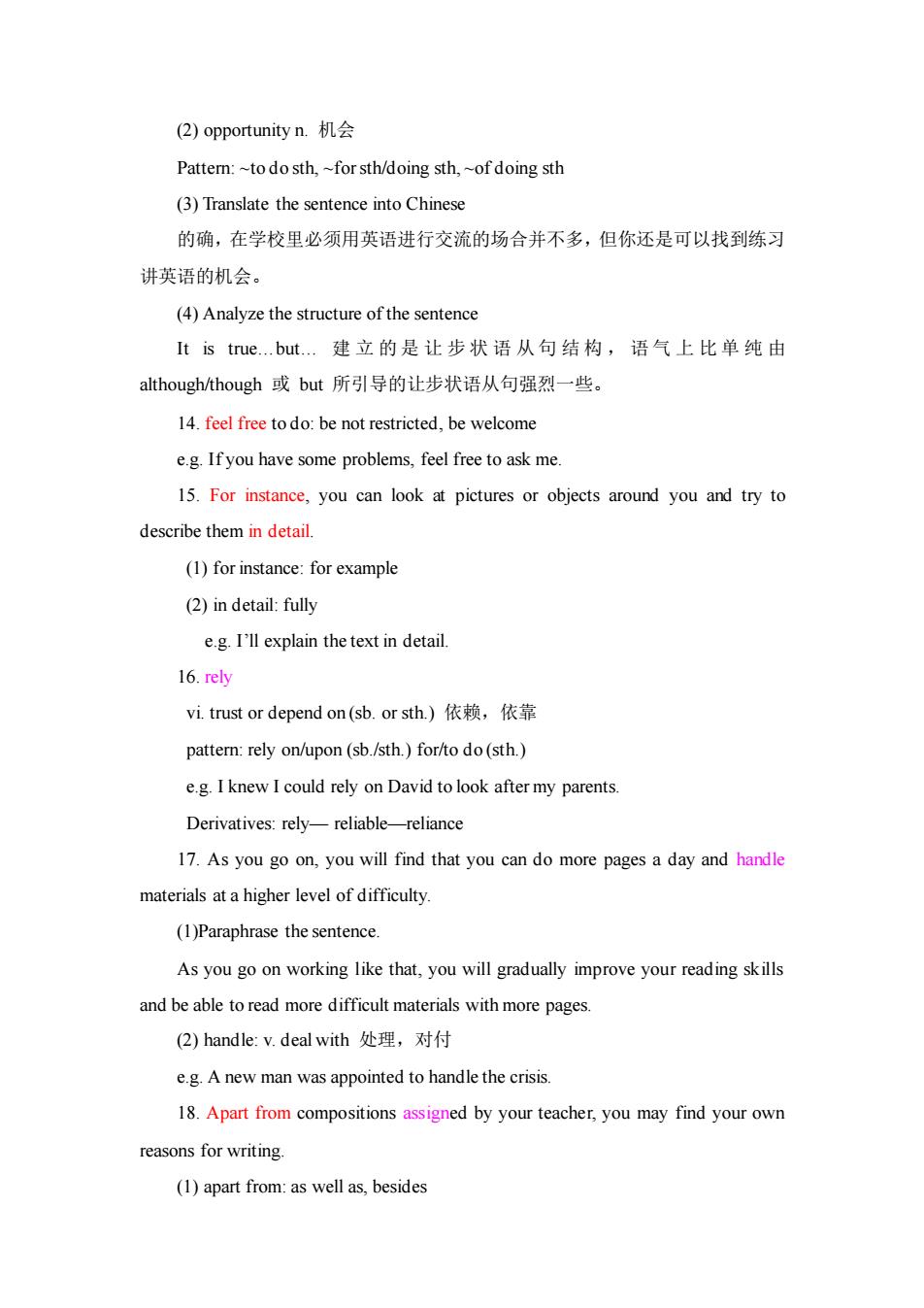
(2)opportunity n.机会 Pattemn:~to dosth,~for sth/doing sth,~of doing sth (3)Translate the sentence into Chinese 的确,在学校里必须用英语进行交流的场合并不多,但你还是可以找到练习 讲英语的机会。 (4)Analyze the structure ofthe sentence It is true...but..建立的是让步状语从句结构,语气上比单纯由 although/though或but所引导的让步状语从句强烈一些。 14.feel free to do:be not restricted,be welcome e.g.Ifyou have some problems,feel free to ask me 15.For instance,you can look at pictures or objects around you and try to describe them in detail. (1)for instance:for example (2)in detail:fully e.g.I'll explain the text in detail 16.rely vi.trust or depend on(Sb.or sth.)依赖,依靠 pattem:rely on/upon(sb./sth.)fornto do(sth.) e.g.I knew I could rely on David to look after my parents. Derivatives:rely-reliable-reliance 17.As you go on,you will find that you can do more pages a day and handle materials at a higher level of difficulty (1)Paraphrase the sentence. As you go on working like that.you will gradually improve your reading skills and be able to read more difficult materials with more pages. (2)handle:v.deal with处理,对付 e.g.A new man was appointed to handle the crisis. 18.Apart from compositions assigned by your teacher,you may find your own reasons for writing. (1)apart from:as well as,besides
(2) opportunity n. 机会 Pattern: ~to do sth, ~for sth/doing sth, ~of doing sth (3) Translate the sentence into Chinese 的确,在学校里必须用英语进行交流的场合并不多,但你还是可以找到练习 讲英语的机会。 (4) Analyze the structure of the sentence It is true…but… 建 立 的 是 让 步 状 语 从 句 结 构 , 语 气 上 比 单 纯 由 although/though 或 but 所引导的让步状语从句强烈一些。 14. feel free to do: be not restricted, be welcome e.g. If you have some problems, feel free to ask me. 15. For instance, you can look at pictures or objects around you and try to describe them in detail. (1) for instance: for example (2) in detail: fully e.g. I’ll explain the text in detail. 16. rely vi. trust or depend on (sb. or sth.) 依赖,依靠 pattern: rely on/upon (sb./sth.) for/to do (sth.) e.g. I knew I could rely on David to look after my parents. Derivatives: rely— reliable—reliance 17. As you go on, you will find that you can do more pages a day and handle materials at a higher level of difficulty. (1)Paraphrase the sentence. As you go on working like that, you will gradually improve your reading skills and be able to read more difficult materials with more pages. (2) handle: v. deal with 处理,对付 e.g. A new man was appointed to handle the crisis. 18. Apart from compositions assigned by your teacher, you may find your own reasons for writing. (1) apart from: as well as, besides
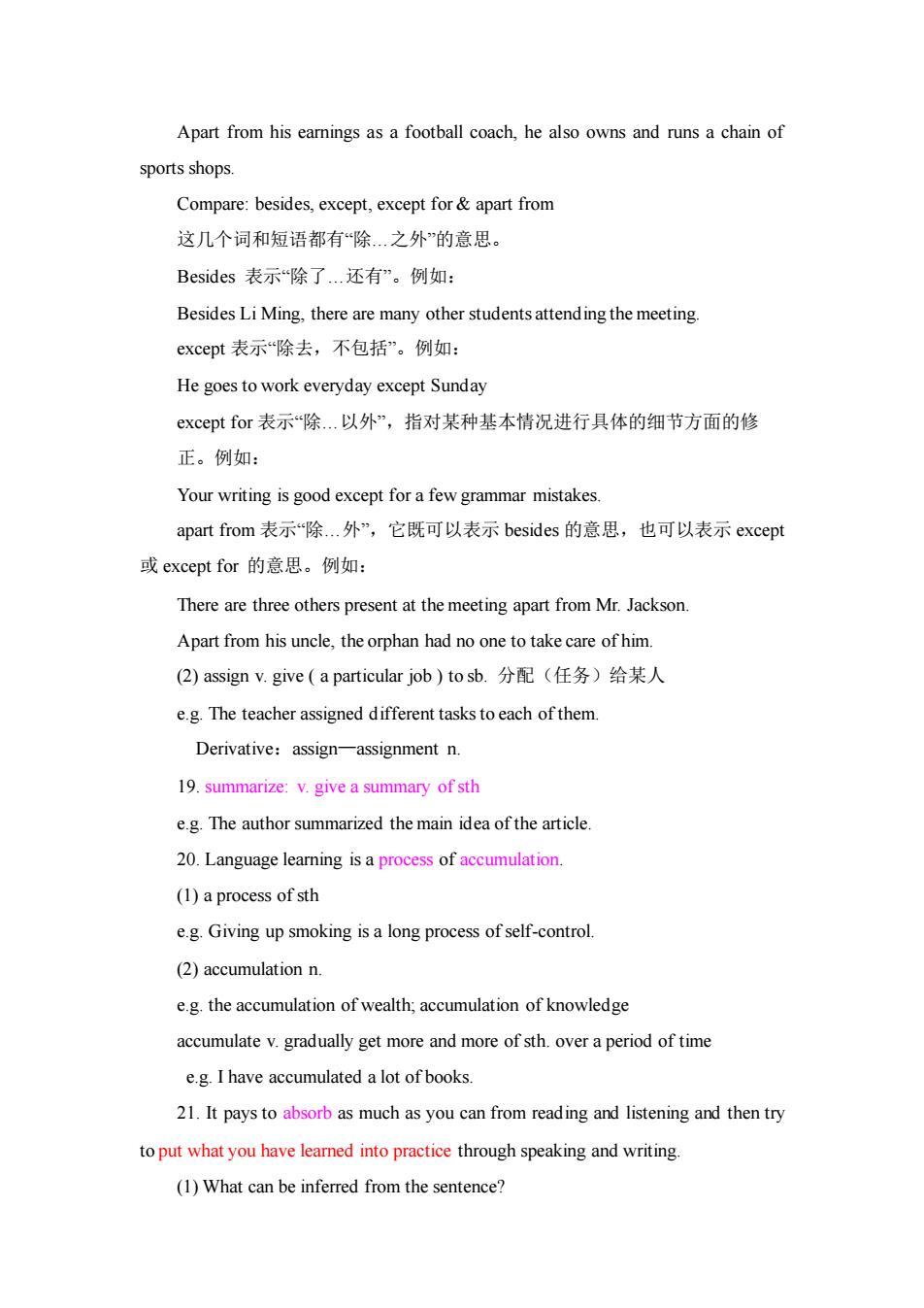
Apart from his earnings as a football coach,he also owns and runs a chain of sports shops. Compare:besides,except,except for&apart from 这几个词和短语都有除之外”的意思。 Besides表示“除了.还有”。例如: Besides Li Ming.there are many other students attending the meeting except表示除去,不包括。例如: He goes to work everyday except Sunday except for表示除.以外”,指对某种基本情况进行具体的细节方面的修 正。例如: Your writing is good except for a few grammar mistakes. apart from表示“除.外”,它既可以表示besides的意思,也可以表示except 或except for的意思。例如: There are three others present at the meeting apart from Mr.Jackson Apart from his uncle,the orphan had no one to take care ofhim. (2)assign v.give(a particular job)tosb.分配(任务)给某人 e.g.The teacher assigned different tasks to each of them Derivative:assign-assignment n. 19.summarize:v.give a summary ofsth e.g.The author summarized the main idea ofthe article 20.Language learning is a process of accumulation (1)aprocess ofsth e.g.Giving up smoking is a long process of self-control. (2)accumulation n. e.g.the accumulation of wealth,accumulation of knowledge accumulate v.gradually get more and more of sth.over a period of time e.g.I have accumulated a lot of books. 21.It pays to absorb as much as you can from reading and listening and then try to put what you have learned into practice through speaking and writing. (1)What can be inferred from the sentence?
Apart from his earnings as a football coach, he also owns and runs a chain of sports shops. Compare: besides, except, except for & apart from 这几个词和短语都有“除…之外”的意思。 Besides 表示“除了…还有”。例如: Besides Li Ming, there are many other students attending the meeting. except 表示“除去,不包括”。例如: He goes to work everyday except Sunday except for 表示“除…以外”,指对某种基本情况进行具体的细节方面的修 正。例如: Your writing is good except for a few grammar mistakes. apart from 表示“除…外”,它既可以表示 besides 的意思,也可以表示 except 或 except for 的意思。例如: There are three others present at the meeting apart from Mr. Jackson. Apart from his uncle, the orphan had no one to take care of him. (2) assign v. give ( a particular job ) to sb. 分配(任务)给某人 e.g. The teacher assigned different tasks to each of them. Derivative:assign—assignment n. 19. summarize: v. give a summary of sth e.g. The author summarized the main idea of the article. 20. Language learning is a process of accumulation. (1) a process of sth e.g. Giving up smoking is a long process of self-control. (2) accumulation n. e.g. the accumulation of wealth; accumulation of knowledge accumulate v. gradually get more and more of sth. over a period of time e.g. I have accumulated a lot of books. 21. It pays to absorb as much as you can from reading and listening and then try to put what you have learned into practice through speaking and writing. (1) What can be inferred from the sentence?